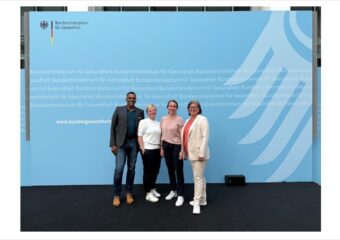GHPP-PharmTrain Fellowship: Training in Clinical Assessment of Medicinal Products at the BfArM
October 2022 – Eight PharmTrain fellows from the national medicines regulatory authorities of Ghana, Tanzania and Zimbabwe came to visit the Federal Institute for Drugs and Medical Devices (BfArM) in Bonn for two weeks. Following one and a half years of regular virtual trainings, this event was a further highlight providing in-depth insights into the structures of the BfArM, the marketing authorisation procedures in the EU and, of course, the assessment of clinical trials.
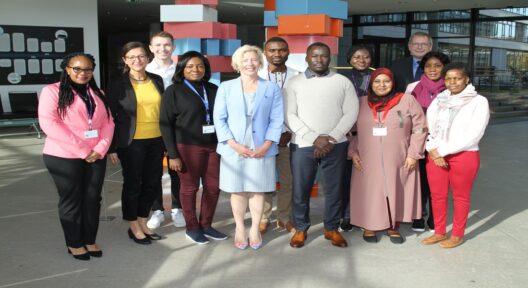
Prior to the study visit
After the successful fellowship at the BfArM with two colleagues from Ghana and Zimbabwe in 2019, the corona pandemic forced the project team to change plans. Already initiated preparations for a continuation of the onsite programme had to be dropped. Instead, with the Online Fellowship ’21, a completely new format was introduced. The GHPP PharmTrain project team compiled a highly interactive, virtual programme for nine colleagues from the African partner authorities. Staff from BfArM, WHO and external experts trained the fellows within this train-the-trainer programme in the mechanisms and marketing authorisation procedures of the European regulatory system as well as other topics related to clinical drug evaluation.
The knowledge and skills acquired in 2021 through these trainings formed the basis for the follow-up activities. When the fellows from the national regulatory authorities Medicines Control Authority of Zimbabwe (MCAZ), Tanzania Medicines and Medical Devices Authority (TMDA) and Food and Drugs Authority (FDA) Ghana met again for the kick-off of the so called FellowshipPlus in March 2022, the study visit to the BfArM, the largest national medicines regulatory authority in the EU, was already shining through as a highlight. In addition to providing ample opportunity for personal exchange and knowledge transfer, this onsite event should particularly enable participation in important multilateral discussion panels in the European Committees for the Authorisation of Medicinal Products, as well as hands-on assessment exercises based on real marketing authorisation dossiers. These in-depth insights and direct touchpoints could not be achieved by an online training.
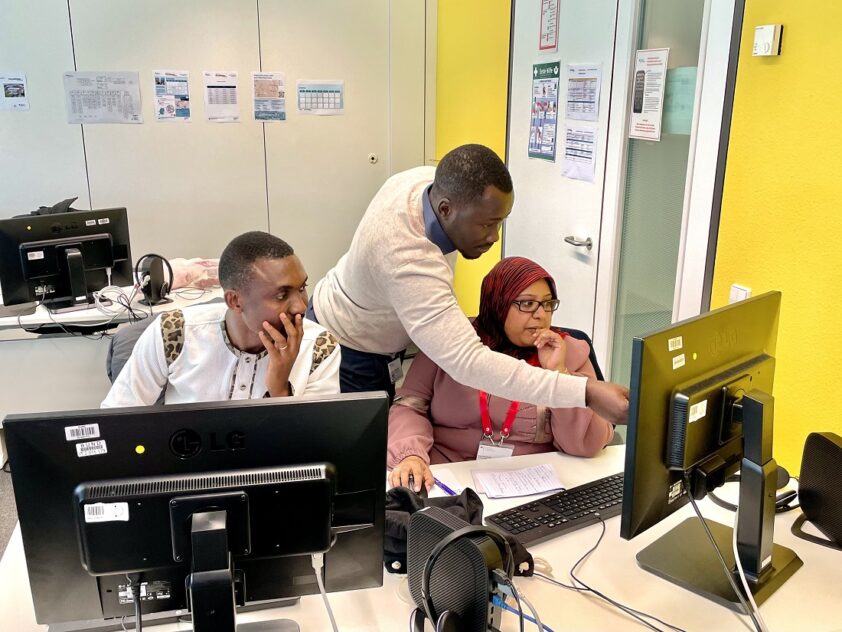
Visiting the BfArM
To the great excitement of the partners and the project team, preparation and arrival went smoothly. From the beginning of October, the fellows engaged into two intensive weeks full of lasting impressions: new scientific insights and regulatory viewpoints, as well as many wonderful interactive moments.
The focus of the study visit was twofold: On the one hand, experiencing how the clinical evaluation of medicinal products is discussed at the European level and how harmonised decisions are reached; on the other hand, how the acquired expert knowledge can be effectively passed on to colleagues both at the national authority and beyond on the African continent following the train-the-trainer principle.
The programme included trainings by experts on the marketing authorisation procedures in Europe and their special features such as the European scientific advice procedure as well as the cooperation between the European Medicines Agency (EMA) and the national European authorities. In this context, the fellows took the opportunity, to attend a presentation by the Director of the EMA, Emer Cooke, and to meet the President of the BfArM, Prof. Dr Karl Broich.
Within PharmTrain fellowship I learn a lot of things, that will help to bring the capacity in Africa to another level.
Clariator Mvurume, MCAZ
First and foremost, however, the fellows were to actively engage and become creative: in small groups of varying composition, they evaluated the clinical study data of a current marketing authorisation application. Engaging in lively discussions, together searching to fulfill the set tasks, they arrived at sound questions and well-founded decisions. Afterwards, they presented their findings to the other fellows. The small groups were each composed of employees from the different regulatory authorities, who were thus able to exchange their experiences, build trust in cooperation and consolidate the fellows’ group network. BfArM staff experienced in drug regulation, biostatistics and clinical assessment of medicinal products guided the eight fellows and answered their thought-through questions. After analysing the essential aspects of the marketing authorisation application, the fellows participated as observers in the virtual meetings of both the Committee for Medicinal Products for Human Use (CHMP) and the Coordination Group for Mutual Recognition and Decentralised Procedures Human (CMDh) – two of the most important committees in the EU for the harmonised marketing authorisation of medicinal products. Attending the discussions of the committee members from the different EU Member States and following their decision-making on the marketing authorisation application, parts of which they had previously assessed themselves, was particularly instructive, as a supranational medicines authority – the African Medicines Agency (AMA) – is currently being established in Africa.
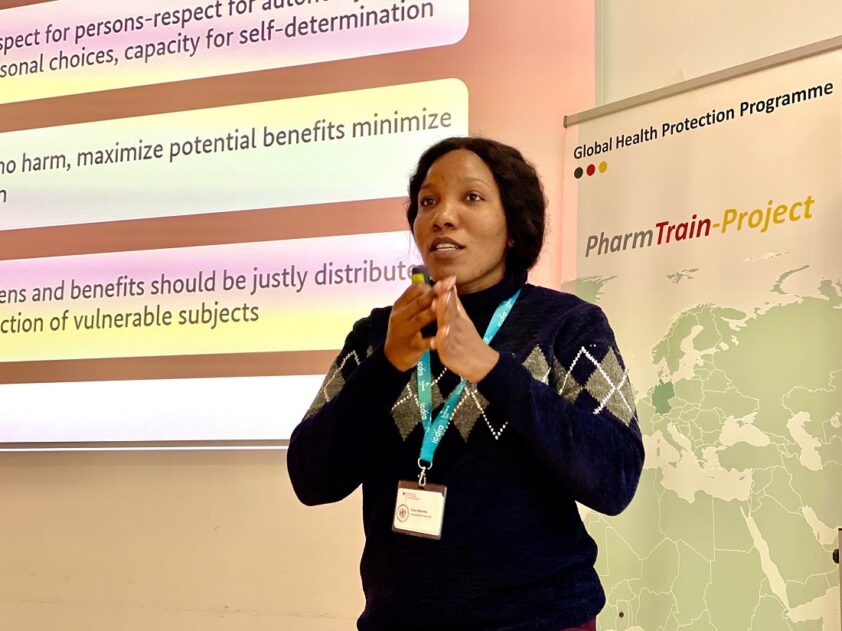
Train-The-Trainer
Sustainability of the activities is of utmost importance to the GHPP PharmTrain project’s concept. To ensure that the fellows efficiently pass on the acquired knowledge to other regulators on the African continent, a two-day intensive didactic training was part of the study visit. While the partners had already been trained in this topic through an online session in 2021, this on-site seminar served for refreshing and expanding the topics: How do I prepare? How do I structure my training? How do I activate my students? What are the differences between online and face-to-face training? After addressing these issues, it was the fellows’ turn: everyone gave a short training session on a clinical-regulatory topic, trying to convey the content in a way as understandable, clear and memorable as possible. Their colleagues, the PharmTrain team and the professional communication trainer provided an instant, detailed feedback on the training style. This resulted in numerous suggestions and impulses for the further development of the fellows as trainers.
Once we get home we will encourage collaborations and discussions among the assessors from Ghana, Zimbabwe and Tanzania. We have gained a lot of knowledge from the exchange.
Asare Yeboah, Ghana FDA
As a core component for ensuring consistency and sustainability a manual for clinical drug assessment has been conceptualised. This aims at enabling a standardised training across the regions and will be further pursued in the upcoming years.
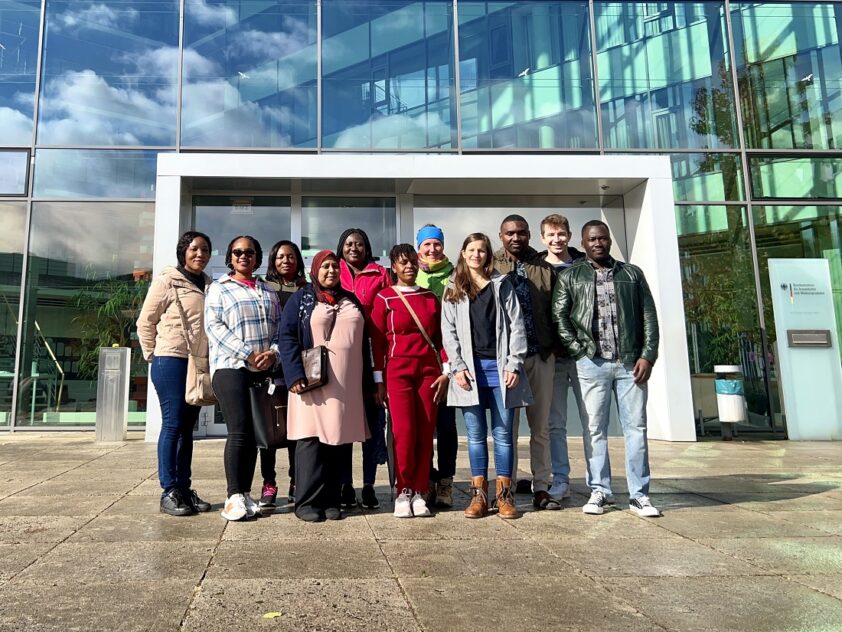
What’s next?
The time flew by due to the comprehensive programme and the warm, friendly atmosphere. Apart from many new, relevant insights, both for the guests and the hosts, also lots of bright memories as well as the anticipation of a reunion in Bonn with new exciting content in the coming year are remaining at the end of this study visit. In the meantime, the fellowship will continue with regular virtual meetings to share scientific content through practical questions and tailored tasks on different topics related to the clinical assessment of medicinal products.
I see this group as an important contributor to the operationalization of the AMA. The African Medicines Regulatory Harmonization programme is reviving continental committees on regulatory capacity development and the evaluation of medical products. These committees, in my view, have missions similar to GHPP and can work closely together in strengthening regulatory capacity.
Alex Juma Ismail, TMDA
Date: October 2022


